My Media Journey: Women in media must go out and seize career opportunities to break newsroom barriers – Justin Asishana
Justina Asishana is a Nigerian Woman in Media with a focus. Her love for Journalism and sharing her knowledge in the field is a passion she wears on her sleeves. As the Niger State Correspondent for The Nation Newspaper she has volunteered with several CSOs and NGOs especially those that are media-oriented. Her responsibilities as the Niger State Correspondent is to report daily happenings across Niger state while still carrying out investigative stories which are not particularly focused in Niger state. She is also a Fact-Checker. Today, she combines her seniour role as a correspondent alongside her passion for media and career development. In this Special LightRay 100 Women in Media Leadership Project supported by WSCIJ, Report Women and Gates Foundation, she take us on a remarkable journey into a land known more for its obscurity. Enjoy!
The first time I read one of your stories, I remember how surprised I was to learn you were based in Niger State, a place that feels obscured in Nigeria, and yet you were gradually going mainstream as a lone female voice in the region making impact. What tips in personal development, career pursuit, network strategies, and wealth creation would you advise women in media, including men, to tap into to break certain barriers as you have done?
I would encourage women in the media to apply for opportunities in areas they want to develop. As my mentor, Mr Lekan Otufodurin, says, “Only those who apply for opportunities are considered and not those wishing to or imagining they are not in the class of those that can be selected.”
Women in the media should not be scared of paying for courses, training, or attending a workshop or seminar. And when they attend these programmes, they should try to maximize the network of journalists they would meet. Also, female journalists should try to get a side hustle which would be another source of revenue, multiple streams of income is key in our current economic situation and they should try to save no matter how little they can, remember that little drops of water can make an ocean. So they should try saving and they should also invest in what would bring them profit.
I have seen you play around a lot with digital tools. In this day and age where digital space is the new currency for the media, how important is this shift at this time in your career? And why do you think tech, AI, and digital skills are important for a journalist?
In every career, there comes a time when a shift is needed. Journalism has had several shifts from the days of old. The shift is important because it helps in simplifying my work and makes it easier for me to multitask and be creative at the same time. Tech, AI, and digital skills are important for journalists, especially in the current digital age we are in. Any journalist who does not embrace and try to learn it would not be able to be innovative and would be left behind in the scheme of things.
You’ve been working in the media and development space for a while now, was this a conscious decision? Or what led you to choose to work in that space?
Working in the media and development space was a conscious decision because media and development goes hand in hand. Media goes a long way in the development of communities, societies and nations. I decided to work in the media and development space because I feel it is not only okay for me to write the routine stories as required but to go deeper into what ails the society and bring it on the fore and also to use my reports or get groups to use my reports as pointers for advocacy in order to advocate for change and development.
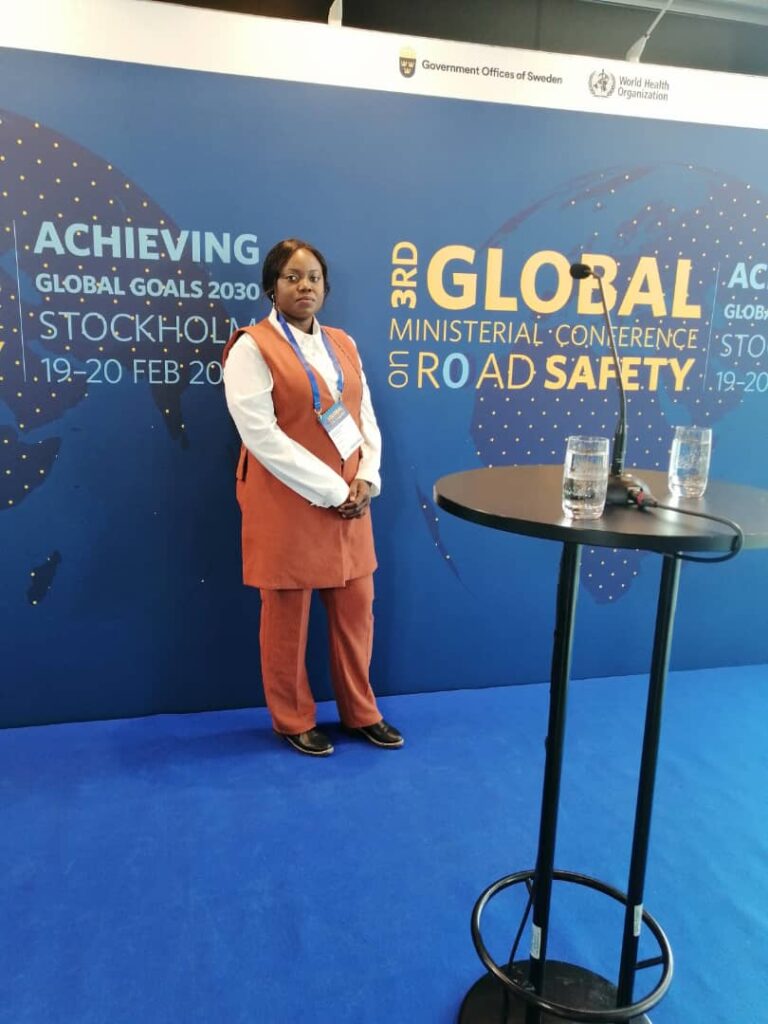
Asishana at the Global Ministerial Conference on road safety in Sweden.
“Working in the media and development space was a conscious decision because media and development goes hand in hand. Media goes a long way in the development of communities, societies and nations. I decided to work in the media and development space because I feel it is not only okay for me to write the routine stories as required but to go deeper into what ails the society and bring it on the fore and also to use my reports or get groups to use my reports as pointers for advocacy in order to advocate for change and development.” – Justina Asishana.
Working in the media and development space has been a conscious decision for me because I realize that there is need for capacity building and development of journalists while mentoring is a concept people are not aware of which is a tool to development. I decided to go into this after being a beneficiary of several training and capacity building programmes and realized that several journalists are not opportuned to access these opportunities while some are not aware of it at all. If as beneficiaries of training and capacity development, we step down what we learn to our colleagues, it will go a long way in addressing the gaps we see in journalism and the media as a whole.
Tell us some of the ideas and projects you’ve executed in the media and development space.
I have conducted several training and capacity building programmes for journalists mainly in Niger state. I have done several fact checking training, I have done two data journalism training, a mobile journalism training, during the COVID-19 period, I conducted training on how to effectively report COVID-19 and vaccine and I organized the first Niger Women in the Media Summit and by the Grace of God, the second edition would hold this year. I have also assisted several NGOs in Niger state to organize outreaches and projects mostly regarding menstrual hygiene and SGBV.
https://mediacareerng.org/2019/12/11/journalists-counsel-youths-on-use-of-social-media/
What more do you think the media and development space can do more or gaps that you’ve identified need to be closed?
I think the media and development space can do more in follow ups. It is not just okay to go to a community or group of people to find out and report their challenges but there is need to return back to find out what had happened after the report, if there was any change or if there was no change and to report that also or use that for future advocacy.
When was the first time you knew journalism was going to be your passion and career?
I had known since I was in secondary school that journalism was going to be my career. When I had the choice of choosing my course for my tertiary education, I selected mass communication as all the choices I had. I didn’t have any plans of reading any other course then. However, I knew journalism was my passion when I entered into the job proper when I knew that my reports may be the only tool giving a group of people or a community the voice they need.
What were some of the struggles for you in the early stages of your career, and how did you overcome them?
Some of the struggles I had in the early stages of my career include instability in the job and finances, non support from colleagues, my location and the decision to explore into other areas of journalism like investigative journalism, fact checking and training.
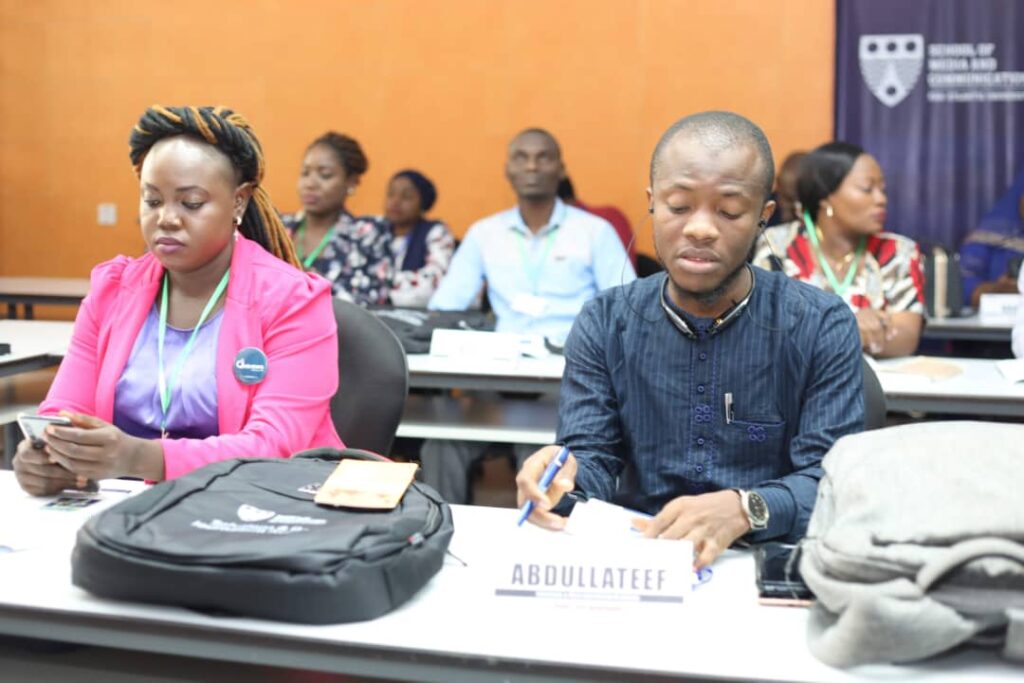
How did you pivot or even change the course of your career?
I began my Journalism practice in New Nigerian Newspapers some years before the newspaper stopped physical production and I worked for about two years without a salary and when New Nigerian went down, I moved on to Daily Newswatch and the same fate befell the newspaper, in fact, I was in Newswatch without being paid before I moved on to The Nation, that was how unstable my early journalism years were. However, what kept me going was my determination not relent as I tried my best in getting opportunities and volunteering for several CSOs and NGOs in Niger state which gave me exposure and improved my skill and that aspect covered for the financial instability.
When I began practicing, I faced serious hostility from some journalists in the state that it took years after I was affiliated to a newspaper organisation to be admitted into the Correspondent Chapel in Niger state, I was able to overcome this struggle because I had two Mentors who stood by me and due to my availability to learn and be mentored, these Mentors took up the struggle and fought for me making journalism practice easy.
Regarding my location, I have always thought that media opportunities, grants and fellowships were meant for journalists in Abuja and Lagos and felt that Niger state really had nothing to offer and is not a well known state, so any journalist practicing there will not be known and cannot meet up with these opportunities but year after year, I studied several of the reports that got these grants and fellowships and decided my reports can meet up as I try to report the underreported issues happening across the state, so with that determination, I decided not to let my location hinder me from applying for media opportunities. Going into investigative journalism and other field of journalism has really been a struggle as it is one of the field of journalism that female journalists do not want to get into but seeing the need to hold government accountable and bring to fore issues that are not known to the public but are happening made me venture into it and I appreciate ICIR, WSCIJ, ICFJ and CJID for the grants that have enabled me carried out the investigations I have done so far.
Do you still have any current challenges you’re trying to overcome?
For now, funding because I want to hold several training and capacity building workshops in Niger state but I am being challenged by funding. And yes, I still deal with hostility and bad mouthing from colleagues.
What are some of the barriers you think has prevented you from hitting the career target you’ve set for yourself?
Funds have been the barrier that has prevented me from hitting the career target I set for myself. Sometimes, I want to write some reports but there would be no funding for travellinh and stuff. Another instance, I began the Niger Women in the Media Summit and intended it to be an annual event that would bring women in the media across the state to address issues and acquaint themselves with best practices in media practice but unfortunately, there has not been funds to hold the event annually.
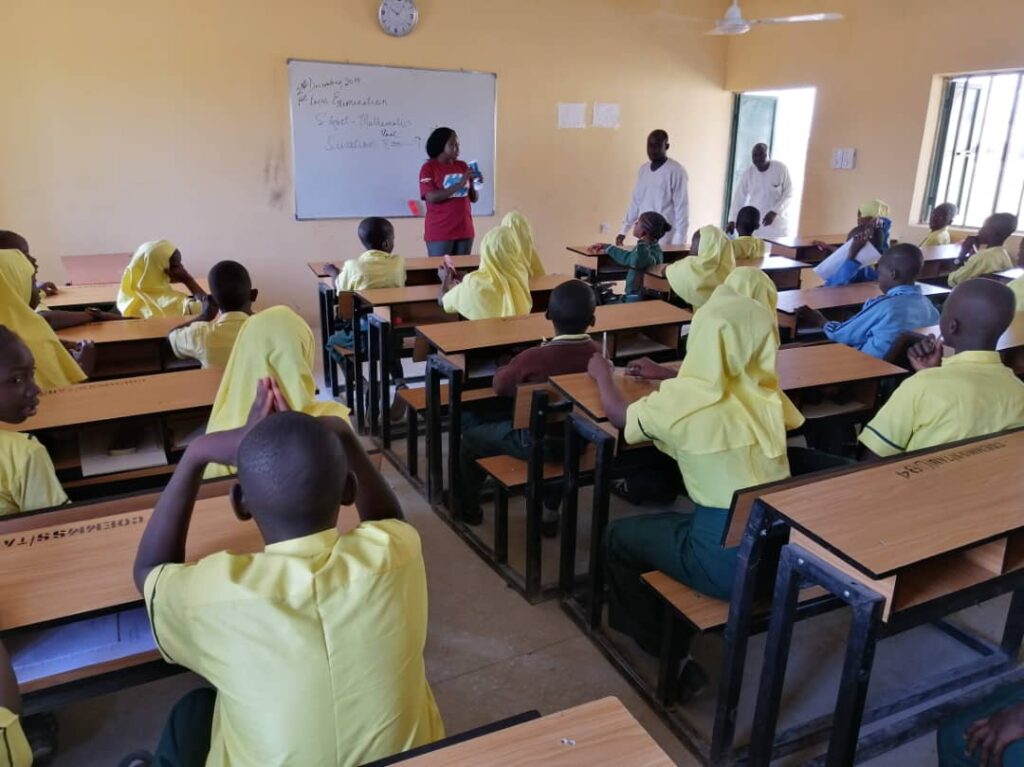
Asishana takes fact-checking to schools in Northern Nigeria. PC: Asishana.
“I am currently a fellow of several networks including Report Women Network, African Science literacy Network, ICFJ Road Safety Fellow, ICFJ Global Malnutrition Fellow, a member of the African Fact Checking Alliance (AFCA), AWJP Fellow and a ONE Champion. I got nominated for the Sigma Awards for Data Journalism in 2021 and got the Africa Media Development Foundation (AMDF) 2021 Journalist of the Year Award.” – Justina Asishana.
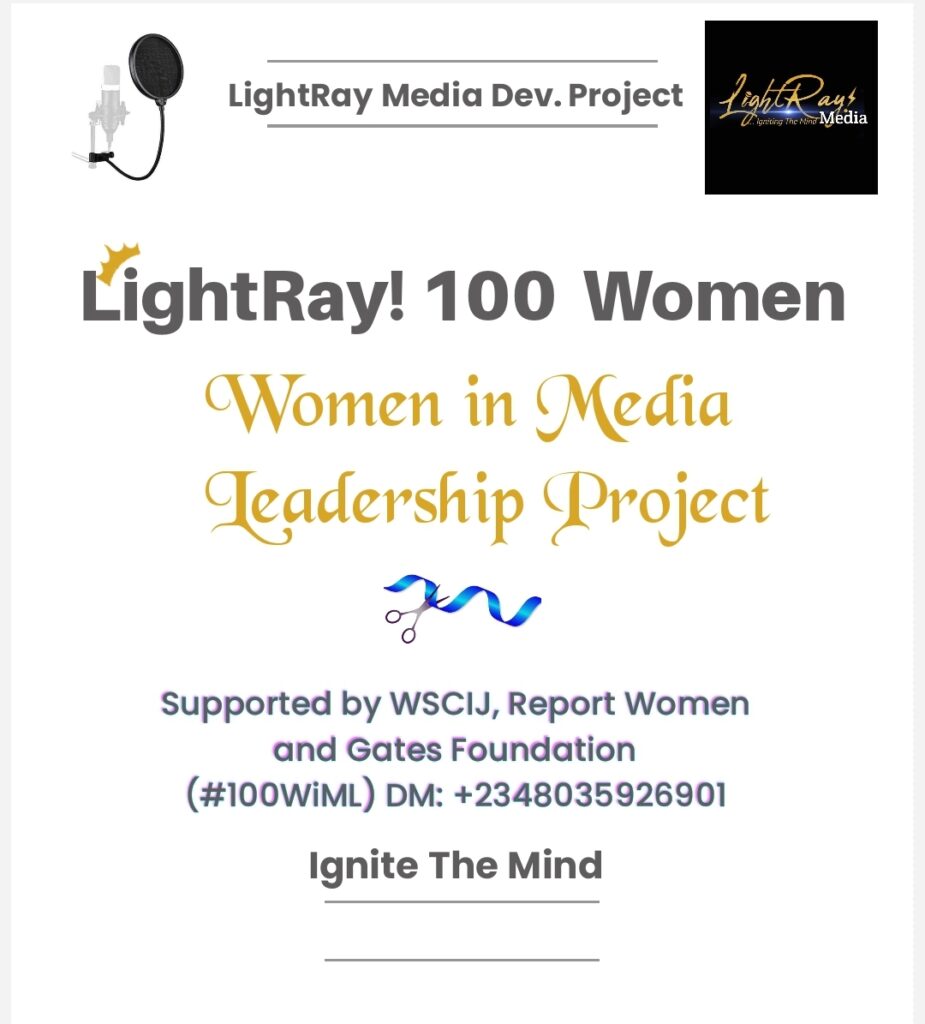
I am one who is passionate about training and retraining of journalists and I have organised a few for some journalists in Niger state but the training is not held as often as I would have loved it to be due to lack of funds. The ones I have done were done out of my own resources. I am also into mentoring of journalism students and young journalists but the mentoring project hasn’t been that frequent because of lack of funds. So ultimately, lack of funds is the top barrier for me.
And how do you plan to overcome them? Why is it important for you to overcome them?
For now, I am seeking collaborations and partnerships for the projects that I have and I hope they will come through very soon.
What are some of the stories or projects you’ve done that were the most impactful in the course of your career?
I have done several covering health, education, agriculture and governance and they have all been impactful. Several of the reports I have done on the people displaced by banditry in Niger state have been impactful and it made me realize that several people do not have who to speak about their plight to the government and I can be that plug.
What career projection are you setting up for yourself you intend to meet up?
I am projecting being a female Journalist to be reckoned with, a Media Coach and Mentor.
What training programmes or short courses have you attended, which you applied to the job that made the most impact for you?
I have attended some training programmes which have impacted me a lot. However, the data and investigative training programmes I received from ICIR, Pan Atlantic University and CJID turned me from being a regular ‘daily routine report’ Journalist into a Data/Investigative Journalist.
What suggestions will you give media owners or heads of media business to help boost morale, effectiveness, and reduce toxicity in the workplace?
Media owners and heads of media businesses should seek to improve the capacity of their staff, this would boost effectiveness and build morale. There should also be an understanding to journalists as the bosses should ask about their wellbeing and look out for signs of burnout or mental stress, and be ready to recommend what would address it. Providing the necessary tools for work will also boost effectiveness. And they should pay their staff well. It is the extreme morale booster.
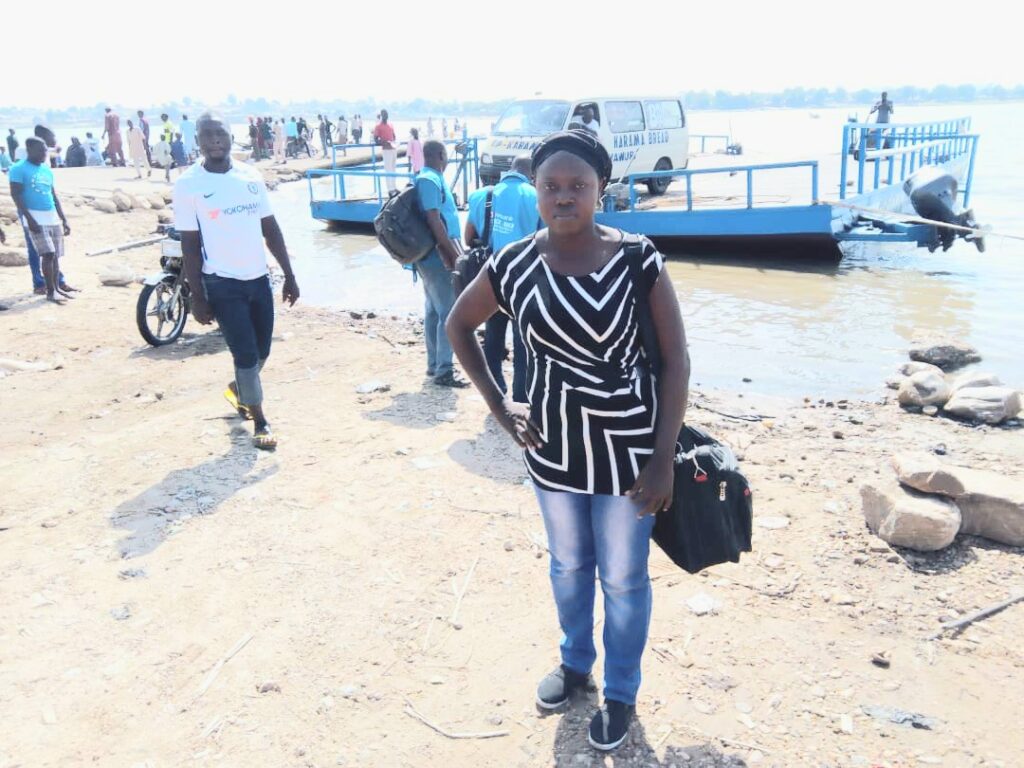
I decided not to let my location hinder me from applying for media opportunities. Going into investigative journalism and other field of journalism has really been a struggle as it is one of the field of journalism that female journalists do not want to get into but seeing the need to hold government accountable and bring to fore issues that are not known to the public but are happening made me venture into it and I appreciate ICIR, WSCIJ, ICFJ and CJID for the grants that have enabled me carried out the investigations I have done so far. – Justina Asishana. PC: Asishana.

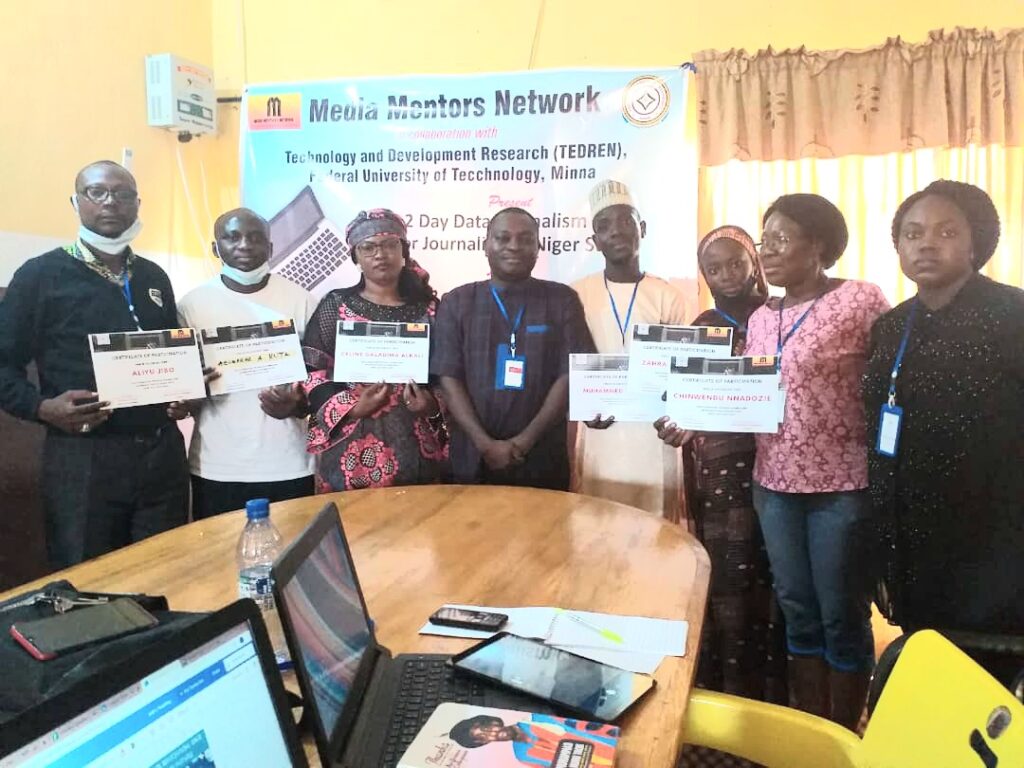
If you were to reimagine your career, what would you do differently, starting today?
I would begin to take up media opportunities and fellowships from the first year I began working as a journalist.
How and what can women in media begin to do differently and better to hold their own space within the media industry?
Women in the media need to be intentional in their goals, expectations, and growth. They should not accept the status quo that there are some areas that they can’t cover. They should be ready to work hard and stop giving excuses. If we are demanding our own space, we should know that excuses would not work, and because of other commitments and responsibilities,we will need to work twice as hard, but we can do it. Women should also try to hold other women’s hands and support them, be their cheerleaders. Women in the media also need to improve their capacity. They need to make learning a continuous process and be ready to put in the work.
Tell us about some of your accomplishments that make you proud of yourself and continue to inspire you to do more?
I am currently a fellow of several networks including Report Women Network, African Science literacy Network, ICFJ Road Safety Fellow, ICFJ Global Malnutrition Fellow, a member of the African Fact Checking Alliance (AFCA), AWJP Fellow and a ONE Champion. I got nominated for the Sigma Awards for Data Journalism in 2021 and got the Africa Media Development Foundation (AMDF) 2021 Journalist of the Year Award. Belonging to these networks and being a recipient of several awards, grants and nominations have inspired me to do more. It has encouraged me to know that my location or where I practise journalism does not matter as long as I do my best with utmost professionalism and continue to be the voice of the voiceless. Another part of my accomplishments are my reports which have made tremendous impacts and have led the state government to address the issues raised while in other cases, the reports are being used as advocacy tools to advocate change.
How do you balance your personal life, work, and family expectations?
Which aspects give you the most challenges, and how were you able to overcome them? – It is difficult trying to balance my personal life, work and family expectations but I try to work things out. I am still learning to do that . For now, I always tried to take time out with family when the need arises and ensure that every spare time I have, I spend with my family. I also take time to brief my family about my day which makes them understand when I need to be in the closet to brainstorm with myself and work on deadlines.
Tell us something about the media industry you would like to see change for the better?
I would like to see more media mentors to encourage the younger journalists and I would love to see young journalists who are passionate about the job and are ready for mentoring. Another change I would like to see is for the media Industry to put the welfare of their staff in top priority.
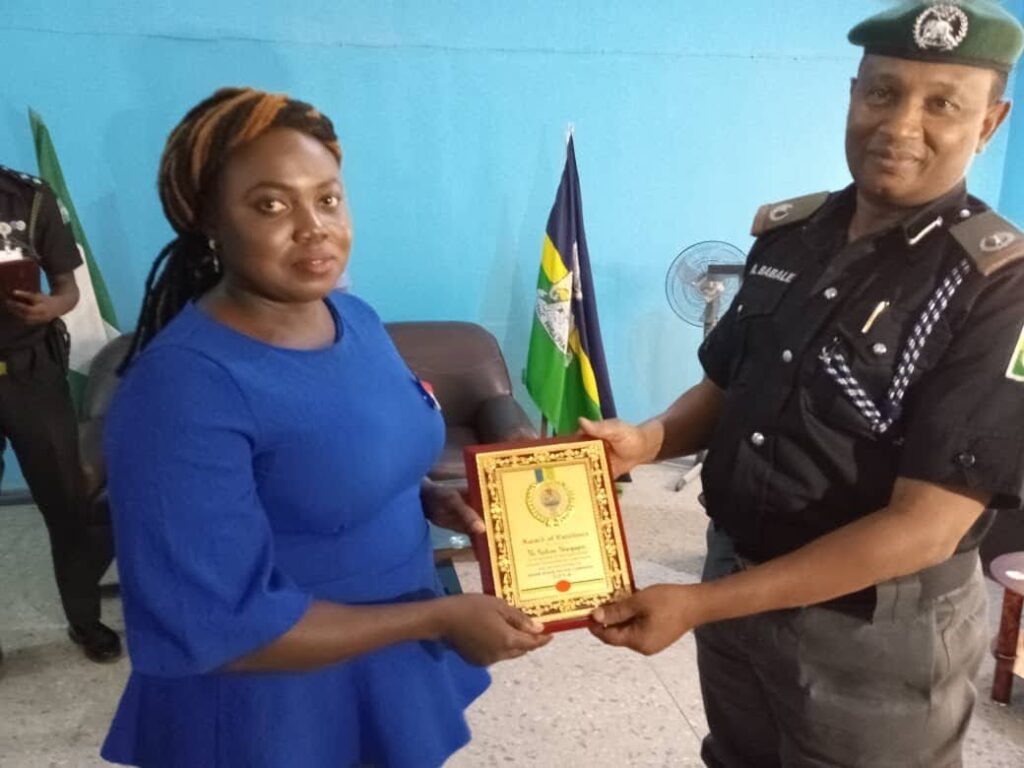
In the next 3-5 years, where do you see yourself?
In the next three to five years, I see myself working for an international media organisation and becoming a top Media Coach and Mentor.
How do you think the Nigerian media can up its ante to compete more favourably with international media organisations?
I think Nigerian Media organisations need to up their ante in training and retraining of their staff and bringing them up to date with standard best practices in the media space. Training is important as it would improve the capability of journalists. Another action Nigeria Media organisations need to take is to improve its remuneration to its staff as the remuneration of some journalists are not encouraging at all.
In your years on the job, have you ever experienced burnout, mental fatigue, or mental health crisis? How did you handle it?
Yes, I have experienced burnout and mental fatigue. I remember in 2021, during the abduction of the Kagara students, I got so stressed that it got to a point that I had to tell my Editor that I was stressed out and wanted a break. I faced severe mental fatigue during that period but after the release of the students, I was able to get myself back. Recently, early this year, I experienced burnout or I would say writer’s block as I had several opportunities to access grants but I couldn’t come up with any story idea which was unlike me, I was so concerned that i had to take some days to rest and stay away from anything that required writing but after a couple of weeks, I got myself back. I am not really one who tells people what I am facing, so I couldn’t even tell some friends who were expecting me to send in my pitches that this was what I was facing, however, taking time out helped me a lot.
How can women and men in the media reduce burnout, mental health breakdown, or prevent it?
I think they will need to take lots of rest and get a hobby that would calm them or make them laugh. They should not just be after work but should have life after work and have people they can talk to or activities that can make them relax.
Let’s talk about online harassment… have you experienced it in any form?
No, I haven’t.
Any other threats on the job?
I think it is normal as Journalists to get threats from actors who are not happy with your reports. Yes, I have had threats in every form.
How did you deal with it?
Most often, when I get these threats, I inform those colleagues who are close to me and since there has not been any one who has really carried out that threat, I just feel they want to use it to scare me from carrying out my job. On other occasions, I block whoever is the perpetrator from seeing my posts or being able to reach me online. At least, if it is on social media, it is my space and I won’t allow anyone to frustrate me in my own space. So you stress me, I block you, simple.
What steps can women in the media take to prevent or deal with online harassment, etc?
They should not keep it to themselves, they should let people know about it and if it becomes frequent from a particular person, they should report it to security agencies.
If you were to suggest to women, indeed journalists in general, on how they can up their ante on online security, what tips would you give?
Women journalists should not be so much after followers that they will not block anyone who threatens their peace of mind or harasses them online. The block button is there for them to use. Remember that it is your personal space, and they have the right to allow who has access to it.

“. . . Not accepting to be mentored is one common mistake I have observed most journalists make. There is this believe that mentors use people by sending them on errands they do not want to go but they get the concept all wrong. I have enjoyed mentoring and it has been part of what helped me in my career projection and I usually say it, if being used will make me learn and gain higher heights, please I make myself usable.” – Asishana.
What are some common mistakes you have observed journalist make in the course of their career you’ve observed? And why do you think this happens?
I think not accepting to be mentored is one common mistake I have observed most journalists make. There is this believe that mentors use people by sending them on errands they do not want to go but they get the concept all wrong. I have enjoyed mentoring and it has been part of what helped me in my career projection and I usually say it, if being used will make me learn and gain higher heights, please I make myself usable.
How do you chill, relax, while giving attention to your wellbeing?
I chill by reading. Travelling calms me down a lot and makes me relax, chatting with close friends, watching skits on TikTok makes me laugh when I am tensed up, listening to music and being creative also makes me relax.





Comments